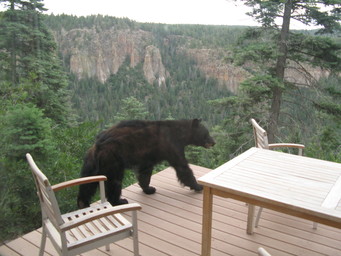
SANTA FE – Due to drought conditions throughout the state, the New Mexico Department of Game and Fish is urging residents to be aware of the increased chances of encountering bears and other wildlife.
“The state has experienced less than average precipitation for this time of the year, which means that bears may be in search of other food sources”, said Rick Winslow, bear and cougar biologist with the Department. “Droughts historically have led to a lot of bear conflict, not only at camping and picnic sites, but also in more populated areas.”
“For bears, almost all of their food resources, such as green grasses and forbs — flowering and grass-like plants — are sustained by moisture,” Winslow said. When these food sources are stressed, bears may start moving closer to towns and neighborhoods. Bears that move into populated areas can cause problems and may become habituated to humans. Problem bears that are deemed a threat may be euthanized.
The Department offers the following suggestions if you visit, or live in, bear country:
- Keep trash properly contained until the day of pickup, especially if you reside in, or close to, wooded areas.
- Never leave fruit from trees and bushes to rot on the ground. It can be a powerful attractant to bears and other wildlife.
- Remove bird feeders. Bears see them as high calorie treats, and often they will look for additional food sources nearby.
- Never put meat or sweet-smelling food scraps, such as melon, in your compost pile.
- Don’t leave pet food or food dishes outdoors at night.
- Clean and store outdoor grills after use. Bears can smell sweet barbecue sauce and grease for miles.
- Keep your camp clean, and store food and garbage properly at all times. Use bear-proof containers when available. If not, suspend food, toiletries, coolers and garbage from a tree at least 10 feet off the ground and 6 feet out from the tree trunk.
- Keep your tent and sleeping bag free of all food smells. Store the clothes you wore while cooking or eating with your food.
- Sleep a good distance from your cooking area or food storage site. A distance of at least 100 yards is recommended.
Never intentionally feed bears to attract them for viewing.
If you encounter a bear:
- Make yourself appear large by holding out your jacket. If you have small children, pick them up so they don’t run.
- Give the bear plenty of room to escape, so it doesn’t feel threatened or trapped. If a black bear attacks you, fight back using anything at your disposal, such as rocks, sticks, binoculars or even your bare hands. Aim for the bear’s nose and eyes.
- If the bear has not seen you, stay calm and slowly move away, making noise so the bear knows you are there. Never get between a mother bear and her cubs.
If you are experiencing a persistent problem with bears, please contact your regional Game & Fish office or contact your local law enforcement for immediate assistance. Visit the Department’s website to find contact information for local Department offices. For more information about living with bears in New Mexico, please consult Keeping Bears Alive and Yourself Safe.